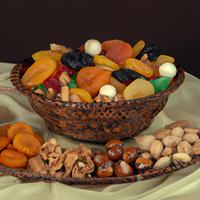
1 serving (30 grams) contains 150 calories, 4.5 grams of protein, 9.0 grams of fat, and 15.0 grams of carbohydrates.

Log this food in SnapCalorie

Nutrition Information
Calories |
750 | ||
|---|---|---|---|
% Daily Value* |
|||
| Total Fat | 45 g | 57% | |
| Saturated Fat | 7.5 g | 37% | |
| Polyunsaturated Fat | 0 g | ||
| Cholesterol | 0 mg | 0% | |
| Sodium | 7.5 mg | 0% | |
| Total Carbohydrates | 75 g | 27% | |
| Dietary Fiber | 12 g | 42% | |
| Sugars | 60 g | ||
| protein | 22.5 g | 45% | |
| Vitamin D | 0 mcg | 0% | |
| Calcium | 120 mg | 9% | |
| Iron | 4.5 mg | 25% | |
| Potassium | 1050 mg | 22% | |
* Percent Daily Values are based on a 2,000 calorie diet. Your daily values may be higher or lower depending on your calorie needs.
Food Attributes
Source of Calories
About Dry fruits and nuts
Dry fruits and nuts are nutrient-dense foods enjoyed across global cuisines, often prized for their rich flavors and health benefits. Dry fruits like raisins, figs, apricots, and prunes are dehydrated fruits packed with vitamins, fiber, and naturally occurring sugars, offering a concentrated energy source. Nuts such as almonds, walnuts, cashews, and pistachios originate from diverse regions like the Mediterranean, Middle East, and tropical zones, and are excellent sources of healthy fats, protein, antioxidants, and key nutrients like magnesium and vitamin E. Frequently used in baking, desserts, and savory dishes, these items also shine as standalone snacks. Their health benefits include heart health, better digestion, and sustained energy. However, some dry fruits contain added sugars, and nuts, while nutritious, are calorie-dense, so moderation is essential. Embraced in traditional and modern cuisines worldwide, they are cherished for their versatility and contribution to a balanced diet.



